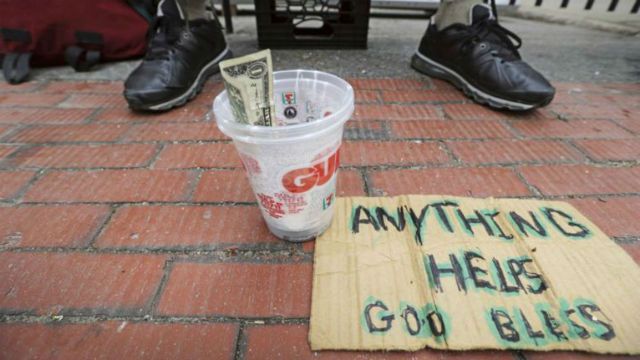NEW ORLEANS -- Panhandling is protected by the First Amendment right to free speech, and a New Orleans suburb's ordinance requiring a panhandling license "offends the United States Constitution," a federal judge has ruled.
The U.S. Supreme Court has ruled that charitable groups have a free speech right to ask for money. "That holding compels the conclusion that the First Amendment also protects an individual's right to ask for charity," District Judge Lance Africk wrote in a 32-page opinion.
The ACLU of Louisiana and the city of Slidell each had asked Africk to rule without trial. He granted the ACLU's motion.
People don't have to register with Slidell police to stand on the sidewalk and ask people to "think of the poor" — or to do so and donate to the Catholic church or their favorite charity or politician, Africk noted — only when saying, in effect, "think of the poor and please help me."
He said he also doubts that Slidell has shown the public safety problem it claims led to the ordinance. The city argued that 70 complaints about panhandlers since 2015 brought only 14 arrests, because police couldn't identify the panhandlers in 56 complaints.
"A mere seventy complaints since 2015 ... does not substantiate an epidemic of panhandling," Africk wrote.
Even if the city had shown a rise in aggressive panhandling and "making panhandlers wear nametags" would promote public safety, the ordinance is too broad, he said.
The opinion affirms that the Constitution protects even unpopular speech, the ACLU of Louisiana's executive director, Marjorie Esman, said in a news release.
Slidell "may not ban messages it doesn't like or punish people for asking for help," she wrote.
There can be reasonable limits, she said in an interview, citing New Orleans' restrictions against "aggressive panhandling, where you follow someone around or grab an arm" or public safety ordinances against obstructing roadways.
The ACLU sued for three men, saying they all panhandled in Slidell, usually at high-traffic intersections.
The city had agreed not to enforce the ordinance while it was being challenged.
Lawrence Abbott, who represented Slidell, says he cannot comment because a status conference scheduled Monday means the case is still pending.
The case is among numerous challenges to anti-panhandling ordinances around the country.
The U.S. Supreme Court turned down an appeal last year asking it to reinstate an ordinance against panhandling in the historic district of Springfield, Illinois.
After successfully blocking an ordinance that restricted the places where people could ask for money in Grand Junction, Colorado, the ACLU sent letters last year telling 34 other Colorado cities and towns they should rescind ordinances the group described as even more restrictive.
It has challenged Cleveland ordinances against "aggressive panhandling," saying they make pleas of poverty a crime. The city doesn't prohibit panhandling itself, but restricts where it's legal.
In February, the Kentucky Supreme Court overturned a Lexington ordinance that barred begging along public streets and intersections, saying it violated free speech rights.
The Washington state Supreme Court invalidated two sections of an anti-begging ordinance last year, saying the bans against begging at highway ramps and major intersections were overly broad and violated the First Amendment.
Slidell's ordinance would have required panhandlers to wear the city license on their chests.
Esman said she didn't know whether her clients were now carrying signs saying they didn't need licenses.
"Wearing signs saying they don't have to wear signs? That's a good question, and I don't know," she said, laughing.





